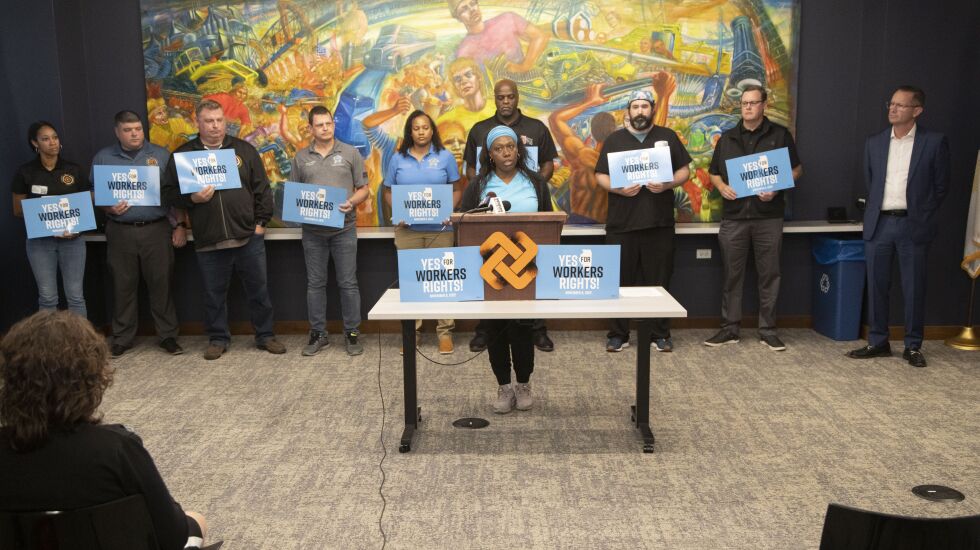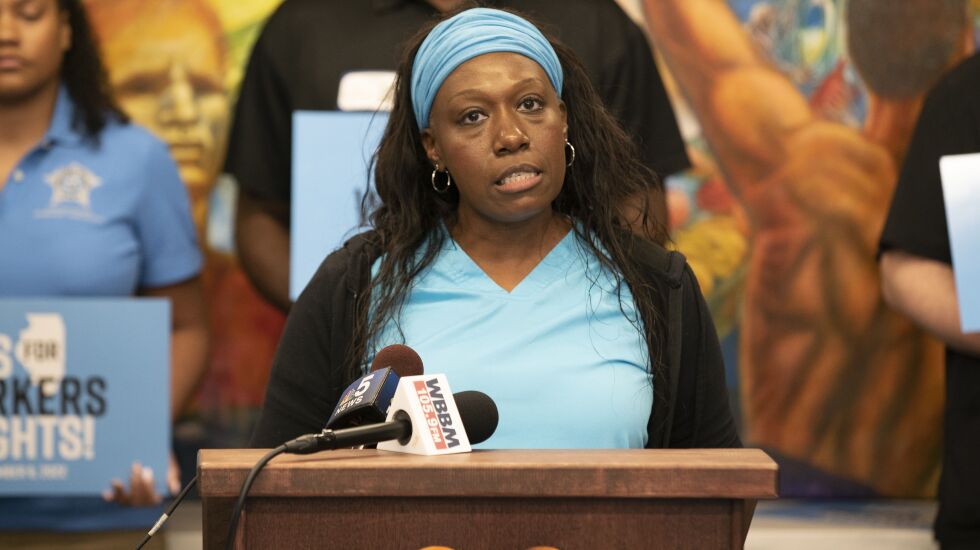At the top of the ballot for the Nov. 8 election, there’s a torrent of words about an amendment to the Illinois Constitution. Voters who surf the language will figure out it has something to do with workers’ rights.
Supporters of the amendment hope people will “do the right thing,” as soft-selling precinct captains used to say, and enshrine collective bargaining rights as fundamental Illinois law. Detractors say the measure amounts to a power grab by organized labor that will raise the cost of government and, therefore, property taxes.
“This property-tax argument doesn’t make sense,” said Robert Reiter Jr., president of the Chicago Federation of Labor, which is leading a well-funded union push for the amendment. “The more profound impact will be on the private sector.”
Reiter cited the amendment’s explicit ban on right-to-work rules, which allow people to avoid paying union dues as a condition of employment.
Twenty-seven states have right-to-work laws in the private sector, and the unions want to be sure Illinois never joins them.
The opposition argues that right-to-work lacks popular support and is a nonissue in Illinois. Critics concentrate on the amendment’s broad language that they say tilts toward organized labor, especially in government settings. They also say the measure brands Illinois as hostile to business.
“We need to learn from our past mistakes,” said Mailee Smith, staff attorney and director of labor policy at the Illinois Policy Institute, which prizes limited government and is a nerve center for right-wing advocacy. She compared the amendment to the state constitution’s protections for public-worker pensions, calling it a “rigid rule” that would tie governments’ hands when managing finances.
“This is a government union power play,” Smith said.
Public-sector unions such as the American Federation of State, County and Municipal Employees are using the treasure chests of trade unions to promote an amendment with broad consequences, she said.
If adopted, the amendment would encourage unions to bring public policy issues into negotiations with government employers, she said. Smith mentioned attempts by the Chicago Teachers Union — so far in vain — to bring affordable housing goals and funding for police into collective bargaining.
Reiter said critics are playing on fears of rising property taxes. “It’s a pretty flimsy argument. They’re making it because they’ve got nowhere else to go,” he said.
At issue is the amendment’s language. It gives workers the right to unionize and bargain for wages, hours and working conditions, but also “to protect their economic welfare and safety at work.” The rest of the language forbids right-to-work laws.
Two caveats: One is that federal law already guarantees the right to unionize. The other is that right-to-work laws already apply to public-sector employees across the country. That’s been the case since the U.S. Supreme Court in 2018 sided with Mark Janus, an Illinois government worker, in his challenge to forced union dues. The Illinois amendment cannot change that.
Stephen Glickman, a Chicago labor lawyer who represents both workers and employers, said unions should be free to bargain strong contracts. But when the Sun-Times spoke with him, Glickman said he’s undecided about voting for the amendment because of its “ambiguous language” on economic welfare and safety.
“What it will lead to inevitably is litigation,” he said. Future disputes could involve the meaning of its terms or whether the amendment conflicts with federal law, which ordinarily supersedes state law. “It will probably lead to more strikes,” which is not necessarily bad, he said. Glickman said both his parents were public school teachers in Chicago, and he appreciates that teachers should get higher salaries.
The Illinois secretary of state has published a pamphlet with the amendment’s text and a summary of arguments for and against it. Most voters, however, will see only the amendment summary that appears on their ballot.

Union leaders contend the amendment would be an important protection if political tradewinds shift and future lawmakers scale back collective bargaining rights. They also argue the amendment would help workers bargain for better equipment, training and schedules, measures that affect public safety.
Pat Quane, a member of Chicago Fire Fighters Union Local 2, said the amendment is important to all firefighters, who can be called into an emergency at any time. “The workers’ rights amendment will protect the ability to speak up for that training and the tools that we need to keep your family safe,” he said.
Debreshia Anderson, an emergency room nurse at UI Health, said, “Too often nurses like myself are forced into dangerous situations such as not having adequate staffing or the equipment needed to care for our patients and for their safety.” Anderson, a member of the Illinois Nurses Association, said other nurses have been disciplined for speaking out about excessive work loads.
“Nurses should never be in fear of retaliation for speaking up for the safety of their patients,” Anderson said.

She and Quane spoke Monday at a news conference the Illinois AFL-CIO organized to promote the amendment.
While critics have focused on potential costs and effects on the business climate, the unions market the amendment as encouraging quality jobs in Illinois. The Illinois Economic Policy Institute, a labor-backed research group, has contended that as more workers receive union pay and benefits, they are less likely to need public aid.
To be adopted, the amendment needs at least 60% approval from those voting on the issue, or majority approval from those voting in the election. It can be a hard standard to meet; nonvotes can have the same effect as opposing the amendment.
Leaders of the union campaign believe the measure will garner enough support. “This is a state that is worker-friendly because our values are all about everyday people,” the CFL’s Reiter said.







